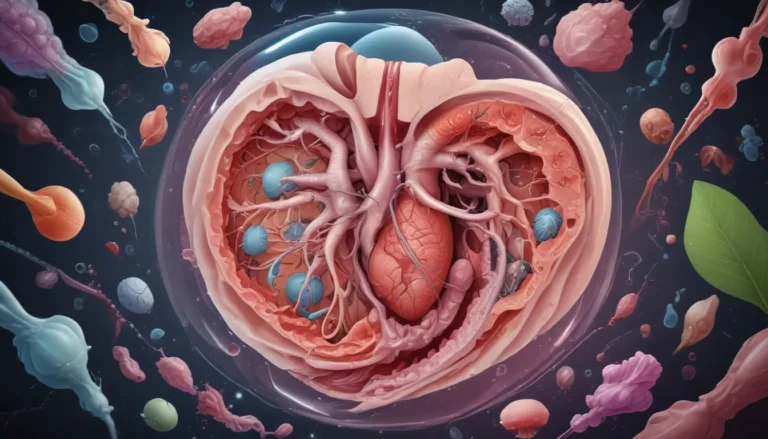A Note About Images: The images used in our articles are for illustration purposes only and may not exactly match the content. They are meant to engage readers, but the text should be relied upon for accurate information.
Welcome to the captivating world of the Major Histocompatibility Complex (MHC), a crucial component of our immune system that works tirelessly to safeguard our health and well-being. Nestled within chromosome 6, the MHC is a genetic powerhouse responsible for producing proteins that enable our immune system to detect and combat foreign invaders such as viruses and cancer cells.
In this comprehensive guide, we will delve into 13 astonishing facts about the Major Histocompatibility Complex (MHC) that showcase its significance and the extraordinary ways it operates within our bodies. From its pivotal role in organ transplantation to its impact on mate selection and disease vulnerability, the MHC stands out as an extraordinary and indispensable element of our biological makeup.
The Marvel of MHC: An Essential Guardian of Our Health
The Major Histocompatibility Complex (MHC) serves as a collection of genes that function as a critical cornerstone of our immune system. It plays a pivotal role in distinguishing between self and non-self, enabling our bodies to defend against foreign invaders like viruses and bacteria.
The Diverse World of MHC Molecules
One of the most remarkable attributes of the MHC is its extraordinary diversity. The genes comprising the MHC exhibit a high mutation rate, resulting in a vast array of MHC molecules across the population. This diversity is vital for the immune system’s ability to identify a wide range of pathogens.
Love at First MHC Sight: Influence on Mate Choice
Surprisingly, MHC molecules can influence mate selection. Studies have revealed that individuals are more inclined to be attracted to individuals with different MHC profiles, enhancing the chances of offspring possessing a varied immune system.
MHC Matching in Organ Transplantation
The MHC holds significant implications for organ transplantation. Ensuring a match in MHC profiles between the donor and recipient is crucial to minimize the risk of organ rejection. The closer the MHC match, the greater the likelihood of a successful transplant.
The Intriguing Polymorphism of MHC Genes
MHC genes exhibit a striking level of polymorphism, showcasing numerous variations within the human population. This polymorphism enhances the immune system’s efficacy in recognizing a broad spectrum of pathogens and offering enhanced protection against infectious diseases.
MHC Class I Molecules: Powering Cytotoxic T Cell Responses
MHC class I molecules play a crucial role in presenting antigens to cytotoxic T cells. By showcasing fragments of foreign substances on their surface, MHC class I molecules trigger an immune response that leads to the elimination of infected cells.
MHC Class II Molecules: Guiding Helper T Cell Activation
MHC class II molecules are responsible for presenting antigens to helper T cells, a pivotal interaction essential for initiating and coordinating immune responses against pathogens.
Dual Inheritance: MHC Genes from Both Parents
Unlike many other genes, MHC genes are inherited from both parents, amplifying the genetic diversity of the MHC within the population.
The Advantage of MHC Diversity for Populations
The abundant diversity of MHC molecules within a population confers a survival advantage by enabling a comprehensive recognition of pathogens, bolstering the collective immune response.
Impact of MHC on Disease Vulnerability
Specific MHC alleles have been identified to influence an individual’s susceptibility to certain diseases, either heightening or reducing the likelihood of developing particular conditions.
MHC’s Role in Autoimmune Diseases
In autoimmune disorders, the immune system mistakenly attacks its own cells and tissues. MHC molecules play a crucial part in presenting self-antigens to T cells, with any abnormalities in this process contributing to autoimmune disease development.
MHC Genes and Olfactory Preferences
Research has unveiled a connection between MHC genes and olfactory preferences. Individuals, as well as animals, may exhibit attraction to specific scents based on MHC profile compatibility, suggesting genetic harmony.
Influencing Vaccine Response through MHC Diversity
The diversity of MHC molecules can influence an individual’s response to vaccines, with differing MHC profiles leading to variations in immune responses that impact vaccine effectiveness.
In Conclusion: Embracing the Majesty of MHC
The Major Histocompatibility Complex (MHC) stands as a captivating and intricate system that holds a pivotal role in the immune response. Comprising a diverse array of genes coding for proteins that facilitate the recognition and elimination of pathogens, the MHC also influences reproduction, tissue transplantation, and disease susceptibility. Through its involvement in antigen presentation, the MHC enables the immune system to accurately identify and combat a wide spectrum of pathogens, showcasing its rapid adaptability that renders it indispensable for vertebrate survival.
FAQs: Unlocking the Mysteries of MHC
-
What is the Major Histocompatibility Complex (MHC)?
The MHC is a group of genes involved in the immune response, crucial for distinguishing between self and non-self molecules and combating pathogens. -
How does the MHC contribute to immune responses?
Through antigen presentation, the MHC displays pathogen protein fragments, enabling immune cells to recognize and target foreign substances for an efficient immune response. -
What is the significance of MHC diversity?
MHC diversity is essential for recognizing a broad range of pathogens, determining disease susceptibility, and influencing organ transplant success. -
Can MHC genes be utilized in personalized medicine?
Yes, MHC genes offer valuable insights into an individual’s immune response and disease susceptibility, aiding in the development of personalized treatments and vaccines. -
How does MHC evolve?
MHC genes evolve swiftly in response to pathogen pressure, with natural selection favoring individuals possessing diverse MHC genes for enhanced protection against a variety of pathogens.
Unlocking the enigmatic realm of MHC unveils just the tip of the iceberg in immunology’s intricate landscape. Delve deeper into the awe-inspiring world of immune responses, where meticulous interplay between cells and molecules safeguards us against diseases. While immune responses are finely orchestrated, deviations can lead to autoimmune disorders, underscoring the delicate equilibrium that preserves our well-being. By grasping these interconnected facets of immunology, we can better comprehend the mechanisms that maintain our health and enhance strategies for preventing and treating immune-related conditions. Discover additional enthralling facts about immunology, immune responses, and autoimmunity in our related articles.






